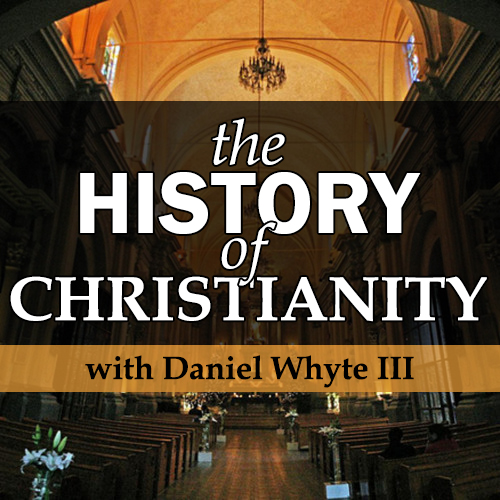This is Daniel Whyte III, president of Gospel Light Society International, with the History of Christianity Podcast #163, titled, “Augustine of Hippo: A Tortuous Path to Faith (Part 4).”
When I became a believer in Jesus Christ, I somehow had the false idea that Christianity began when I got saved. I had no concept of the hundreds of years of history that Christianity had gone through since the time of Jesus Christ over 2,000 years ago. I have found that many believers, young and old, have the same false idea. The purpose of this broadcast is to dispel this notion by sharing with listeners the history of Christianity from the ministry of Jesus Christ all the way up until the present day in an easy-to-understand format. You don’t have to worry: this is not a lecture. This is a look at the basic facts and figures of Christian history that every believer and every person needs to be aware of.
Our Scripture for today is John 5:24 which reads: “Verily, verily, I say unto you, He that heareth my word, and believeth on him that sent me, hath everlasting life, and shall not come into condemnation; but is passed from death unto life.”
Our History of Christianity quote today is from St. Ignatius of Antioch. He said: “My dear Jesus, My Savior, is so deeply written in my heart, that I feel confident, that if my heart were to be cut open and chopped into pieces, the name of Jesus would be found written on every piece.”
Today, in the History of Christianity, we are looking at “Augustine of Hippo: A Tortuous Path to Faith (Part 4)” from Dr. Justo L. Gonzalez’s fine book, The Story of Christianity (Volume 1).
There remained another doubt: How can one claim that the Bible, with its crude language and its stories of violence and falsehood, is the Word of God? Providing an answer to this question was the role of Ambrose [AM-BROZE] in Augustine’s life. Monica, who was with the latter in Milan [MEE-LAHN], insisted that he should hear Ambrose’s [AM-BROZE’s] sermons. As a professor of rhetoric, Augustine agreed to attend the services led by the famous speaker in Milan [MEE-LAHN]. His initial purpose was not to hear what Ambrose [AM-BROZE] had to say, but to see how he said it. However, as time went by he found that he was listening to the bishop less as a professional, and more as a seeker. Ambrose [AM-BROZE] interpreted many of the passages that had created difficulties for Augustine allegorically. Since allegorical interpretation was perfectly acceptable according to the canons of rhetoric, Augustine could find no fault in this. And it certainly made scripture appear less crude, and therefore more acceptable.
By then, Augustine’s major intellectual difficulties with Christianity had been solved. But there were other difficulties of a different sort. He could not be a lukewarm Christian. Were he to accept his mother’s faith, he would do it wholeheartedly, and he would devote his entire life to it. Furthermore, due to the prevalence of the monastic ideal, and to his own Neoplatonic [NEE-OH-PLAY-TON-IK] perspective, Augustine was convinced that, were he to become a Christian, he must give up his career in rhetoric, as well as all his ambitions and every physical pleasure. It was precisely this last requirement that seemed most difficult. As he later wrote, at that time he used to pray, “Give me chastity and continence; but not too soon.”
At this point a battle raged within himself. It was the struggle between willing and not willing. He had already decided to become a Christian. But not too soon. He could no longer hide behind intellectual difficulties. Furthermore, from all quarters came news that put him to shame. In Rome the famous philosopher Marius Victorinus [MAR-EE-UHS VIC-TOR-IH-NUS], who had translated the works of the Neoplatonists [NEE-OH-PLAY-TON-ISTS] into Latin, had presented himself at church and made a public profession of his faith. Then came news of two high civil servants who, upon reading Athanasius’s [ATH-A-NAY-SEE-US] Life of Saint Anthony, had abandoned career and honor in order to follow the hermit’s example. It was then, unable to tolerate the company of his friends—or himself—that Augustine fled to the garden, where his conversion took place.
Next time, we will continue looking at “Augustine of Hippo.”
Let’s pray.
—PRAYER—
Dear friend, simply knowing the facts about Christian history without knowing the One on Whom this faith is based will do you no good. If you do not believe on the Lord Jesus Christ as your Savior, may I encourage you to get to know Him today. John 3:16 says, “For God so loved the world, that he gave his only begotten Son, that whosoever believeth in him should not perish, but have everlasting life.” Just believe in your heart that Jesus Christ died for your sins, was buried, and rose from the dead by the power of God for you so that you can be a part of the church in this life and in the life to come. Pray and ask Him to come into your heart today, and He will. Romans 10:13 says, “For whosoever shall call upon the name of the Lord shall be saved.”
Until next time, remember that history is truly His story.
All Content & Images are provided by the acknowledged source



